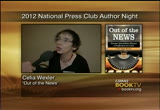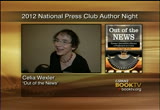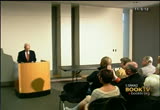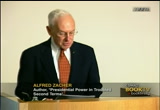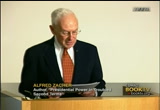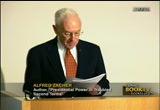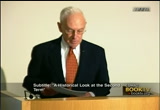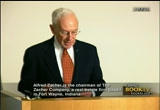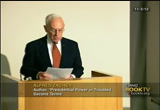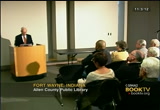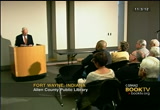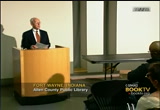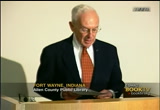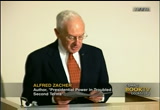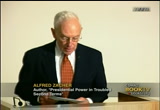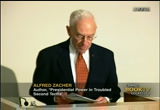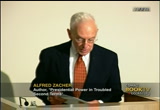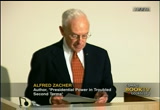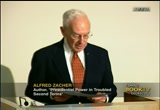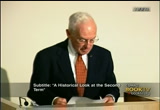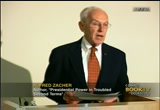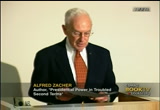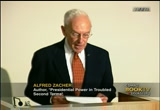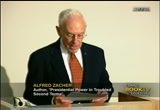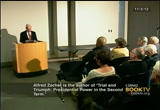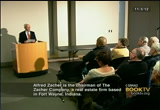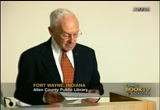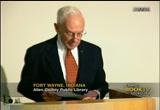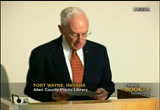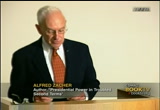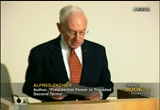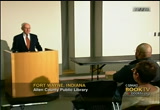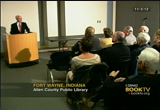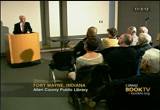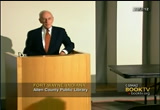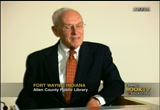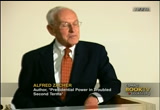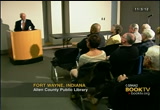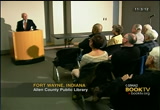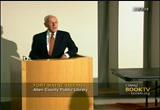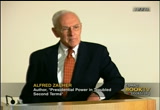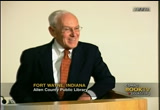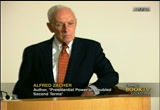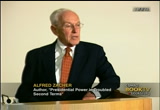tv Book TV CSPAN January 21, 2013 11:15am-12:00pm EST
11:15 am
>> i think the biggest difference is that we are 24/7, so that right now journalists don't have much time at all to go deep. there never was a lot of time to go deep and explore and be thoughtful, but now it's all about breaking news. so that's a big difference. there's also various -- there's not a lot of opportunity for journalists to learn and grow. and become more knowledgeable. and i think that's a difference now, to. spink was there something you heard from all 11 that resonate with you with regard to why they left the profession? >> i think most of them if not all of them said basically i wanted to do more and was asked to do less. >> would you ever come back to journalism? if so, what would you cover? >> i'm not sure. i love writing but i loved writing this book. i think it's more likely i would do another book.
11:16 am
>> if you're a former journalist or if you're interested in the profession, celia wexler is the author of "out of the news: former journalists discuss a profession in crisis." thanks so much. >> thank you. >> you are watching booktv. now alfred zacher presents his thoughts on why some presidents succeed while others fail during their second terms in office. this is about 45 minutes. >> good afternoon. appreciate your being here for this event that we can credit c-span2 for our being here this afternoon. we are familiar with the familiar phrase past is prologue, which is emblazoned on the wall of the national archives. you have heard the phrase
11:17 am
history does not repeat itself, it rhymes. this afternoon, with your assistance, i will attempt to apply past prologue to the history of the second term. but i frankly do not understand history rhyming, so that one will be ignored. we are once again facing the challenge of reflecting our president when the wind is too close to call. we do not expect to witness an election won by a landslide. some will look longingly on the time when one candidate dominated the political scene. lyndon johnson readily be barry goldwater and richard nixon overwhelming george mcgovern. in each of those elections, one of the candidates failed to capture the spirit of the
11:18 am
american voting public. and the winner had the advantage of the weak opponent. franklin roosevelt won his second term, landslide, because of his huge popularity. however, in many more presidential elections, the candidates are in a heated battle to present themselves as the one best capable of serving the country with the winner walking off with the modest majority. it is a customary wisdom that the campaign between the incumbent president and his opponent will be either a referendum on the first term of the president, or a judgment of which candidate will be the better leader. is there really a difference between these two considerations? does not boil down to judging the leadership skill of the incumbent based on his effectiveness during his first
11:19 am
term, versus the unknown leadership skills of the challenger? it's easy to point to the national security, or the economic consequences, or consequent impact on the ratings of an incumbent as a indicator of the popular view of the sitting president or the public was not over enchanted with the war in iraq when george w. bush ran for reelection. against john kerry, but voters by a small margin seen to believed bush would be the better leader. it cannot be said that the vote reflected a favorable referendum on george w. bush's first term. the importance of the communication skills of a candidate cannot be discounted as a factor, however. but all of this misses a
11:20 am
different evaluation that merits being taken into account in judging between an income, barack obama, and his challenger, mitt romney. that is the chinks of the second term on too many presidents. 27 of 19 presidents -- only seven of 19 presidents elected to a second term avoid having a troubled or failed second term. that would give the country about a 30% chance of obama and the nation experiencing an improved security of economic climate. after four years if obama is reelected. i do not suggest that the gamble should not be taken. simply, that history into playing with politics might give us pause. so what does history predicted about a second term for barack
11:21 am
obama lacks were he reelected with so few presidents having success at that time in office. what are the challenges that face those who have trouble or failed second terms, and what about others to succeed? and ken barack obama overcome these challenges if he is reelected to become a member of that select group of presidents that waded through the quagmires of second terms come and somehow came through relatively unscathed? success in a second term does not imply that there were not failures, or significant stumbles. some even severe during that tenure. but the net impact of that time in office had to be the fulfillment of a significant number of the following measures of success. first, the president must
11:22 am
provide defense against foreign or domestic threat. secondly, the president must retain or expand economic, political and/or social opportunities. this becomes the primary challenge that the nation feels secure from military threats. third, the president must be effectively lead congress. since the nation began, there's been a perennial conflict between the executive and legislative branches of government. most presidents will extend their exclusive dance of authority to the utmost. congress, on the other hand, generally seek to limit the president's freedom of action. it's understood, however, that from time to time setting such limits may be needed. fourth, the president must avoid a spirit of invincibility.
11:23 am
of hubris that might cause a president to lose touch with the political reality. five, the president must exercise influence over and effectively communicate with the nation, he must be able to communicate persuasively. six, it majority of american people must i believe in the president's integrity, and have sustained a substantial level of pride in the president throughout the eight years in office. despite specific shortcomings. he must have strengthened the nation on balance by his actions to the president must leave a legacy for the nation. the list of those who prevailed in their second term includes george washington, james madison, andrew jackson, theodore roosevelt, dwight eisenhower, ronald reagan and
11:24 am
bill clinton. lincoln as its successful -- special case and that his second term was so brief. the it is interesting to note that only the president who had a more successful second term than their first was james madison and andrew jackson. the following is an accounting of the presidents elected to a second term, and the reasons for those that have experienced failed or troubled second terms. for failed because of a war that seemed unwinnable, or for lack of preparedness. jefferson, truman, johnson and bush were the four. also, for failed because of economic crisis for failure to act to deter such a crisis. these were jefferson, cleveland,
11:25 am
coolidge, franklin roosevelt from the 37 downturn, and george bush. at failed due to their inability to lead congress were jefferson, monroe, grants, wilson, truman, johnson, nixon and bush. to failed due to hubris, franklin roosevelt, and richard nixon are the four who did not effectively communicate their agendas or initiatives were jefferson, monroe, grant in cleveland. obviously, the dominant source of failure for second term presidents has been their inability to successfully work with congress. fully at second term presidents have faced trouble or failed second terms due to record to the fight between congress and the white house.
11:26 am
having a congressional majority of their own party is no assurance of relief. those presidents who served with congress having a majority of the opposing party during their second term included wilson, eisenhower, nixon, reagan and clinton. the competitive battle between the president and congress dates to the fight's george washington had with congress over the jay treaty. he had won approval only after considering effort working to reckless members of congress, compromising and controlling. that was with a congress having majority of like thinking federalist. and a president who was revered as a national hero. when the democrats won majorities in congress during his second term, eisenhower worked quietly behind the scenes
11:27 am
with the senate majority leader, lyndon johnson, to gain approval of his legislative agenda. ronald reagan developed a close relationship with the democratic speaker of the house tip o'neill, to somehow fulfill his legislative goals, compromise as they were. it might be cynical to postulate that some of nixon's rather liberal legislations forays were prompted by his desire to get along with a democratic-controlled congress. woodrow wilson was the target of republican party that wanted to even many a squabble they had with the president. he defeated both william howard taft and theodore roosevelt to win his first term. he spearheaded liberal legislation they opposed, and got approval of the league of nations that would be selected to vent republican party
11:28 am
hostility to wilson. the treaty was never approved. the votes were there for approval, but the president allowed compromise, but wilson stood firm. it was the president, not congress, that refused to compromise. one of the most successful relationships between a president and congress occurred during the second administration of bill clinton. he had encouraged the democratic party to move more closely to the center politically well before he ran for president. his welfare legislation reflected that. his success in working with newt gingrich and republicans and formulating debt and debt reduction legislation that led to a budget surplus is the cornerstone for success of working with the opposing party
11:29 am
to fulfill a president's legislative agenda. clinton insightfully appointed erskine bowles to represent him in negotiations with congress. bowls, great talents of such bargaining, was important in reaching the president's legislative agenda. but this is followed by the same house of representatives voting to impeach bill clinton. obviously an extreme example of the age-old conflict between congress and the executive branch of government. and yet, bill clinton is listed among only seven reelected presidents who were successful. there are lessons to be learned from the clinton second term that might offer guidance to obama, were he reelected. some of the presidency face hostilities from congress filled with majority of their own party, included washington,
11:30 am
jefferson, monroe, grant, theodore roosevelt, johnson and bush. andrew jackson was censored by a congress controlled by his own democratic party. a fight he never forgave. franklin roosevelt had a constant battle with southern democrats in congress who oppose his new deal legislation. he suffered his greatest political defeat as a democratic-controlled congress refused to support his plan to pass the supreme court. eisenhower, a republican, filed legislation drafted by a fellow republican, victor of ohio, who thought it was the way of presidential power. what then, what his paper is all about, however, is what might be, we expect a four years of a second term for barack obama, were he reelected, obama in all
11:31 am
probability would face the daunting challenge of working with republican majority in house and possibly innocent. what lessons might obama learned from history were he reelected? confronted with a congress dominated by republicans, further complicating his challenge is that appearance, disappearance of the spirit of compromise which is so been a mainstay of legislation throughout the nation's history, with one very momentous exception. members of congress in the south would not compromise on the subject of the expansion of slavery, 11 states seceded and the civil war ensued. we have heard much about the impending battle between the president and congress over the extension of the bush tax cuts, raising the debt limit, and the
11:32 am
potential of automatic cuts in spending. necessity of resolving these issues is what chairman frank he refers to as the fiscal cliff. -- chairman bernanke. it's likely the decision will be given brief extensions so that the next president and congress will be saddled with making the decision. as a second term president, obama would face obstacles rarely experienced by a chief executive returning to office. where he would face sizable numbers of members of the senate and house, whose state they will not compromise. these present ominous clouds on the horizon for a second term for obama. other lessons that obama and the electorate can learn from the experience of presidential history that might give guidance for the resolution of this concern. first, however, it would be
11:33 am
helpful to view obama's background in the customary evaluation of him. his opponents and some of his supporters ask, does barack obama have the leadership skills, experience, cultural background and temperament to deserve a second term as president of the united states? his opponents say no to all of the above, and to ask that -- have socialistic tendencies, including his desire to copy european -- from -- i'm sorry. skipped a page. to desire a copy european government economic policies as
11:34 am
a basis for the campaign to deny him the office. his liberal democratic party complained that he compromise obsessively and the tea party controlled congress and expanding the debt level and other legislation. they express concern he did not appear to be a decisive leader, with such legislation or in the management of the health care proposal. some of his supporters believe congress was given a free rein in the design of health care plans. is accused of destroying bipartisanship, by independents who also are disturbed by what they see as his inability to meet and negotiate with republican opposition. there could be no question that obama like six parents in government, either as governor or as a long-term member of
11:35 am
congress, or in any phase of the business world. further his background in academics and as a community organizer offers no evidence of someone who has the fire in his belly to be a leader. he had primarily been a teacher, counselor, advisor and mentor. he had customarily -- thoughtful and take time to respond for opinions on matters. he had no experience in negotiations at a level that would prepare him to meet republican congressional leaders, or international heads of state. he had no experience or even academic training in either economics or the complexity of governmental finance. obama had no experience initiating vital legislation that might have assisted him in structuring a strategy for his
11:36 am
health care legislation. taking this in experience into account, it almost appears that obama stepped out of character as a person has so aggressively thought to be a state legislature, united states senator, and the president of the united states. obama obviously has to learn all that was required to be president through on the job training. it's possible to conclude, however, observing the weighty legislation passed during his first term that obama is a quick learner. it seems he grappled with the challenges of economic crisis, and the formulation of the stimulus package haltingly. meaning a chance leaning heavily on his economic advisers. the most appropriate comment on the program is that the nation did not falter, that some economic expansion is occurring.
11:37 am
the bailout of the automobile industry seems to be a success. the health care legislation frequently lacks presidential leadership and the judgment of most observers, and then final consideration, it is yet to be determined. all this took place with minimal experience. how well is obama beating the six measures of a successful president? he is probably seen as protecting america with the use of drones and special forces killing osama bin laden and members of al qaeda. his withdrawal of troops from iraq and the plans for the removal from afghanistan is greeted with approval by the majority of americans. at the moment, obama and his refilling the test of security for the nation. although the rise of anti-american uprisings, the killing of our ambassador in libya and the success of taliban
11:38 am
in afghanistan as minimally raise the issue of the defense of the nation as an ingredient in the coming election. is obama providing economic opportunity? he inherited the worst economic crisis since the great depression, but the president is now held responsible for a continuation of high unemployment and minimal hope for its improvement, and also for increases in the debt and deficit. his job legislation proposals are not being well received by republicans. the administration has not proposed any innovative resolution for the severe downturn in housing. and some believe he should have supported and promoted simpson-bowles deficit reduction proposal. he has not been able to significantly expand economic opportunity. how has obama used the tools of
11:39 am
leadership? he attempts to communicate his vision and proposals, but he has appeared so often on television that exposure -- overexposure was agree. he's a capable public speaker, but his speech is usually lack the spirit he showed during his first campaign. he seems to lack the dramatic comedic asian skills of fdr, reagan or clinton. obama frequently comes across as a teacher, or as a motivator, not a motivator. he fails then too, frequently to excite and motivate. although he currently isn't doing bad and the current campaign. there's a reason article in a sunday edition of "the new york times" entitled obama plays to win in politics and everything else. the author paints a picture of
11:40 am
obama that gives a still greater insight into him, and how he might function as a second term president. i'm quoting now from that article. four years ago, barack obama seems as if he might be a deliver a professor of the leader. maybe with a touch of hawaiian mellowness. he has turned out to be a for graciously competitive perfectionist. aides and friends say so in interviews. mr. obama's own words of praise say it best. he is a perpetually aspiring overachiever. as he faces off with mitt romney, mr. obama wilson to win in fear of losing. is in overdrive. he is cramming for debates against an opponent he has called ineffective, raising money and a frantic pace to
11:41 am
narrow the gap with mr. romney and embracing the do anything it takes of an increasingly contentious campaign. even by the standards of political world, mr. obama's obsession with virtuosity, and proving himself the best, are remarkable. those close to him say, in parentheses, critics call it arrogance. when mr. obama was derided as an insufferable overachiever in an early political race, his friends were infuriated. but even those loyal to mr. obama say that his quest for excellence can lead him to cockiness, and they tends to overestimate his capability, end of quote. so what should one predict about a second term for barack obama, particularly with these qualities of character? he most recently exhibited a
11:42 am
combination of moving to the center while preaching was somehow detected as class welfare, targeting the wealthy for more taxes. speaker of the house boehner states that the president backed away from an agreed compromise on raising the debt limit. in an article in "the new york times" magazine tends to support that charge. and a recent book by bob woodward paints a picture of obama standing firm against john boehner and the negotiations. as the apparent requirement for resolution of major legislation approaches, and as it appears that even more rigid positions are being forecast for the next congress, it will take an unusually skillful second term president to deliver solutions to the financial problems facing the nation. if the task rests on the shoulders of barack obama, wilson would not compromise or
11:43 am
will he be like eisenhower, reagan, clinton, and even washington to figure how to win against the odds. of course, to achieve the accommodation with congress, he would need a lyndon johnson, tip o'neill, a newt gingrich to leave the congress majority that would follow. so what specifically would i recommend obama do to attempt to avoid the challenges of the second term? primarily he should point in -- appointing a committee or with the skills of erskine bowles to work with congress on his legislative proposals. he should recommend a creative revision of the tax laws, the serious debt and debt reduction program. he should have congress enacted budget which has not occurred for the past three years. he might come up with a proposal for inventing public-private partnerships to improve
11:44 am
infrastructure, including the electric grid. and, of course, continue to encourage energy independence. the resolution of the supply of unfilled housing should be tried but only if a reelected barack obama can somehow find a unique instrument required to work with this administration to move to the center and discover ways to reach meaningful compromise with the congresswoman to pass legislation that this country so desperately needs. although it's not a -- one can ask will he be reelected. historically rarely have presidents been real elected to a second term with popular ratings in the 40% level, which is where obama rests, but so does romney. interesting to note that only three of the 19 presidents elected to a second term as relatively less popularity ratings at the time of their
11:45 am
reelection. these are woodrow wilson, truman and george w. bush. these presidents experienced trouble or failed second terms. history aside, one cannot discount the possibility of obama would win not based on statistics like this, but because the electorate elected him the best alternative of the two candidates. success in a second term for obama is another matter, however. thank you. glaa[applause] speak we would really welcome questions. it would be an advantage to c-span to have questions and answer period. maybe some of you will -- we
11:46 am
would like you to participate as fully as you can. do any of you have any questions? yes. >> i thought that was a remarkably objective and evenhanded treatment, and very insightful. thank you so much. my question is, given that the president and congress have made no bones about their goal to make him a one-term president, have you seen in your research any other situation that quite compares to that level of directness in terms of that kind of a cool? >> to follow, you were saying that they actually claimed in the first term to oppose the president so as to deny him a second term? that's a very fair question. i would say that, and that would
11:47 am
then be quite a congress of the opposing party. in other words, where we have those presidents that had their own party in power, that would not occur. well, i would think that clinton, interesting enough, in contrast to that is the center of the road, his welfare program, and that, therefore, he did get unexpected support, although where possible, that congress opposed him whatever they could find -- and all the investigation. so there's a good example where they did everything they could to deny him a second term. that's just one example. i -- oh, yes.
11:48 am
wilson -- wilson suffered some of that but it wasn't until his second term that he had a republican congress. and looking back i think clinton would be an easy answer to that. any other questions? yes. >> if he is reelected will he have like only two years to get anything done before the next election cycle starts? >> does he turn into a lame duck rather probably? it takes a very highly regarded president to avoid that. and that's one reason you notice that only really two presidents have more effective second terms than the first, because that first two years of the second term is the only chance of getting much done. reagan i say is an exception to
11:49 am
that, but that was in foreign affairs, not domestic. the lame-duck problem occurs pretty much -- it's a rare president who, in the last two years of his second term, has an effective time. any other questions? >> i'd like to ask a question about woodrow wilson. i understand that he wanted to get the league of nations past and was not able to do that, with what little i know about the league of nations seems like he would've been a good thing. why wasn't able to get past? wasn't strictly political, or why not? >> his opponents in the party recognized his weakness of
11:50 am
demanding that his plan be accepted. and so they selected only one major item. that is the right of the league -- to bring the member nations of war, the battle. and that, the congress, you notice the united nations does not have, does not give the nations that right, particularly because the lessons of the league of nations. and they -- he -- congress said they would gladly redesign the league, in fact all european nations such as ask, we would remove the. he reaches. the public knew he was that rigid in his nature and they just selected that and they just played to their success.
11:51 am
spent it's entirely possible that barack obama may win the electoral vote and may even lose the popular vote or the popular vote may be very close. what effect is that likely to have on his performance in the second term? >> the implication is the weakness that he has, and it's likely that that best if he wins he will have a small majority of either if the electoral college or the popular vote. so that, that would add the congressional, the republican position that they don't have to cooperate with a man who doesn't have a mandate. and the mandate is the thing that would be one of the bases for a president's power in a second term.
11:52 am
and that will not exists for him. so that he is going to have to turn to other devices. and i really, to the point where we she would appoint erskine bowles director. and i know he's only an example, but there are not many people with skills to handle a negotiation like the. and the thing is the word negotiation is truly correct, doesn't deny the president his position that simply tries to work those positions giving up pieces of them so that each side has to give up pieces of it or positions, not either one will give up totally. and if that's the demand that they give up totally, then we're not going to have success. i think that the danger to the
11:53 am
country of not solving our fiscal problems will rest on the shoulders of those, so i assume there will be some movement greater than statistics, the power of the president at the time will have possibly less input. >> we had one president that had more than two terms. is there anything, anything unique about those third and fourth terms? >> is interesting that it's thought that washington said the two-term limit, simply was as though he was a constitutional amendment. but the fact is that grant wanted a third term and that he didn't have his own party
11:54 am
opposing them because they didn't feel he had been a good president. but he would've been a third term president, and theodore roosevelt, if he had not said that he was not going to run again, he would have had a third term. there's no question because his popularity. so that i think your question is -- roosevelt then became a powerful, hugely admired president, because of his third term. but he needed world war ii and the success he had their to make that third term valuable. i've been asked whether or not we should have only one-sixth term. i think allowing the idea of having american people to choose or not choose the reelection of a president one time is enough, because you do have the potential for what we see in
11:55 am
places like chavez and so forth. i would say our system from that standpoint is correct, but i think we don't want third terms. thank you. any other questions? >> yes. there's a question over there. >> with all the studies you have done on the characteristics, is there a person or a couple of people that today, well, not romney and not obama that you think would have those characteristics to lead the country to the issues that face us today? >> and who want to be president? [laughter] that is needed. i think -- the office is
11:56 am
strange, requirement of people. and i did have a section in the paper, and i deleted it specifically because it's on the second term. but whether or not business is a credential for office, and i reviewed the fact that george washington really of all the presidents was probably more into business than any of the other second term presidents. lincoln represented his clients in business and was very effective, but he himself didn't manage his own affairs very we well. and, of course, we have who for -- hoover who could not communicate, whether or not some of his policies were actually adopted by roosevelt, reconstruction, finance, corporations, but he couldn't
11:57 am
communicate. he couldn't put together leadership skills. and, of course, both truman and grant are to failures in business. and george h. w. bush would probably be an example of a president who was a very successful in business, and an effective administrator but he didn't communicate his position well to the american public, and he lost after his first term. so that i would, i would say that -- oh, i think there were some candidates out there that had strength of character, and this was over the years and both the republican and democratic party, governors, one who is now a senator from virginia who had great depth of character who
11:58 am
have self-confidence in a quiet sort of way that could have made them excellent presidents. but they chose not to -- they were not able to win the primary. that's one thing, you could ask whether primaries are better than the old smoke-filled rooms, not equal today. but that's another topic, another question, another paper. any other questions? well, thank you very much. [applause] spent is there a nonfiction author a book you would like to see featured on booktv? send us an e-mail at booktv@c-span.org. or tweet us at twitter.com/booktv. >> this event has been phenomenal. we've had more companies, more space, more innovation and more excitement than ever i can recall. the chairman has made a huge announcement at the show
11:59 am
expanding unlicensed spectra. that deliver wi-fi but there's all sorts of products you can envision. the first great product they came from the light spectrum was a garage door opener. >> does washington understand this world? >> i'd like to think that would do. certainly just being here interaction with a lot of the people who make these devices and provide these services is a part of the. it enables us to better understand what the effects of our decisions are going to be. when we talk about spectrum in washington it's often in the abstract come here about the spectrum, not enough. spectrum just buy services, when you come here and you see what's possible, i was at the qualcomm booth and were able to see wi-fi enabled chips that can allow you to have 300 plus megabits per second, that is a data throughput ensure that would allow you to watch hdtv on a wireless device, very easily. >> the latest on technology and policy fr
209 Views
IN COLLECTIONS
CSPAN2 Television Archive
Television Archive  Television Archive News Search Service
Television Archive News Search Service 
Uploaded by TV Archive on

 Live Music Archive
Live Music Archive Librivox Free Audio
Librivox Free Audio Metropolitan Museum
Metropolitan Museum Cleveland Museum of Art
Cleveland Museum of Art Internet Arcade
Internet Arcade Console Living Room
Console Living Room Books to Borrow
Books to Borrow Open Library
Open Library TV News
TV News Understanding 9/11
Understanding 9/11